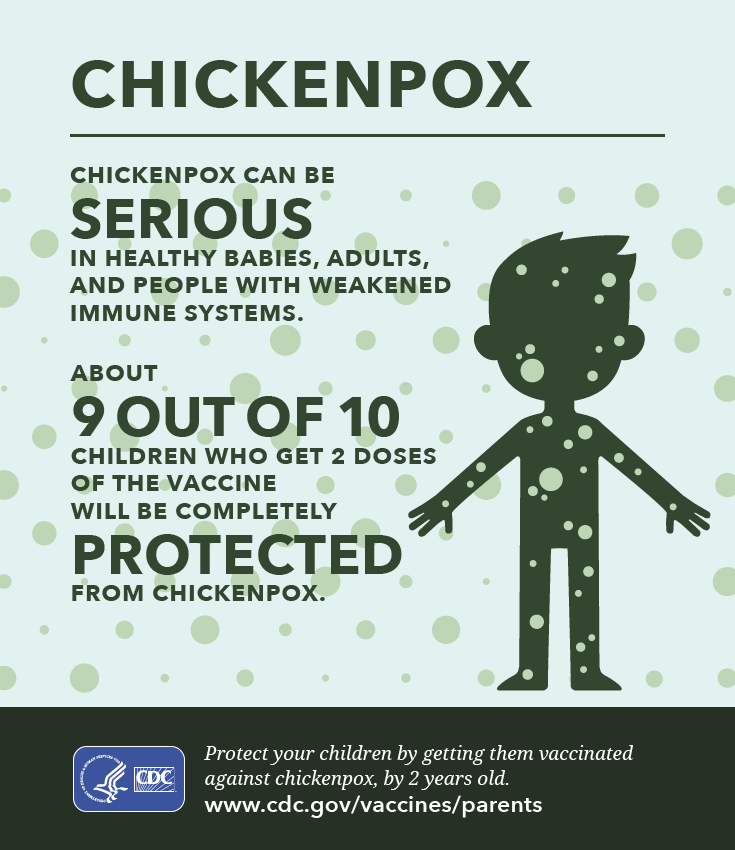Blog

- Details
By Laura Sosinsky, Ph.D.
High-quality child care starts with promoting and protecting children’s health, safety, and well-being. Immunizations are critical to reducing the spread of infectious disease in group child care and keeping children healthy.
Understanding vaccinations and talking with families about them can help child care providers meet regulatory requirements and protect the health of the young children in their care.
Why vaccinate? Young children’s immune systems are not yet built up, making them vulnerable to getting sick. Exposure to contaminants and illness is more likely for young children in group settings than for those who have less contact with other children. Today there are over 16 diseases that are preventable through immunization.
Before vaccines, worried parents used to try to protect their children through uncertain means, such as sending them to the country for the summer to avoid polio. More recently, many of you may remember parents taking their children to chickenpox “parties” hoping early exposure would mean milder illness. Today, we have almost forgotten about diseases like measles, polio, rubella, whooping cough, and diphtheria. High levels of vaccination coverage have resulted in historically low levels of vaccine-preventable diseases and are projected to prevent over 40,000 early deaths and 20 million cases of a disease.
Remarkably, vaccines don’t just protect the recipient. When an overwhelming majority of people in a group are immunized, everyone is protected because there is little chance for an outbreak. This “community immunity” – also called “herd immunity” – gives some protection even to those who aren’t eligible for certain vaccines, such as infants, pregnant women, and people with cancer.
When communities have low vaccination rates, disease outbreaks can occur, such as the measles outbreaks this summer in Minnesota and from Disneyland in 2014, and a 2010 whooping cough outbreak in California which caused 10 deaths among infants too young to be vaccinated. The outbreaks were exacerbated by low vaccination rates prompted by groups of people against vaccines despite their objections being based on faulty and debunked research that falsely claimed a link between vaccines and autism. Other communities’ lower vaccination levels are correlated with fewer resources and related factors, leaving them vulnerable to outbreaks.
How do my program and I comply with regulations and keep children healthy? As emphasized in recent reminders from OCDEL’s Bureau of Certification, early learning programs and staff must follow state and federal requirements:
>Licensed child care group settings must keep records of each child’s immunized status in the child’s health record to meet Pennsylvania Department of Human Services child care regulations.
>All staff in DHS certified child care programs must complete training on 10 critical health and safety topics by September 30, 2017, to comply with new federal child care requirements from the reauthorization of the Child Care and Development Block Grant (CCDBG). The very first of these topics is the prevention and control of infectious diseases, including immunization.
Children who attend child care in group settings or prekindergarten programs operated by a public school district, intermediate unit, or private academic preschool must be immunized according to the CDC’s 2017 immunization schedule. Children who won’t be vaccinated must have on file a documented exemption due to medical, religious, or philosophical reasons. If a child has not yet completed all vaccines, the record must include a doctor’s medical plan with dates for the next vaccines. Homeless children and children in foster care can receive CCDF subsidies with a grace period for immunization documentation.
Parents should be told that during an outbreak of any vaccine-preventable disease at the program, a child cannot attend if the child is not adequately immunized and if a health provider suspects that the child is contributing to transmission of the illness, or if the circulating disease poses an increased risk to the child.
Remember, vaccines protect everybody - caregivers and teachers should be current with routine vaccinations, too!
For more information about vaccines:
>Center for Disease Control (CDC) recommended immunization schedules
>Children’s Hospital of Philadelphia (CHOP) Vaccine Education Center and Parents PACK program
Information about help paying for vaccines:
>The Pennsylvania branch of the Vaccines for Children program
Training and resources for providers:
>PA Keys’ information about how child care staff may comply with the federal requirements by September 30, 2017
>National Center on Early Childhood Quality Assurance (ECQA Center) Brief #1: Prevention and Control of Infectious Diseases
>Pennsylvania Chapter of the American Academy of Pediatrics, ECELS-Healthy Child Care Pennsylvania, that provides consultation, training, and technical assistance about health and safety in child care
>Caring for our Children: National Health and Safety Performance Standards and Caring for our Children Basics: Health and Safety Foundations for Early Care and Education
Laura Sosinsky, Ph.D., works to support successful early childhood programs as a consultant with the Early Childhood Action Collective at PHMC. As a developmental psychologist with experience in research and evaluation of early childhood practice and policy from positions in academia, research, and government, Laura is currently also a Visiting Assistant Professor at Haverford College and a member of the Board of Directors of the Child Care Council of Westchester County, NY. Laura earned her B.A. in Psychology from Cornell University and her M.S. and Ph.D. in Developmental Psychology from Yale University.

- Details
The Early Childhood Action Collective (ECAC) is pleased to share the latest in a series of briefs intended to inform the implementation and improvement of early childhood programs in Philadelphia.
Written by Peggy Hickman, Working with Dual Language Learners and their Families in Early Learning Settings, examines the increasing need to support young children who are dual language learners. Hickman identifies who these young learners are, recommends best practices to support them, and shares resources available for early learning programs.
- Details
By Laura Sosinsky
Parents and early educators alike can see that when young children play, they learn.
Opportunities to learn spring naturally from different types of play. Through pretend play, children understand what people are like and how they think – including understanding themselves – which helps them learn social adjustment and social competence. Messy play and nature-based play support development of sensory awareness – and are exciting to children. Complex play, like dramatic play and partner play, gives children the chance to practice and master skills like attention, memory, and planning (which are part of executive functioning). Block play supports learning math, physics, and engineering. Plus, building with blocks together with other children supports sharing and teamwork. Games are fun, plus through games, children learn appropriate ways to cooperate and compete.[1]
Outdoor play gives many opportunities to support early learning and development. Physical play in outdoor spaces supports health and combats obesity, of course, plus when children have places to explore, children gain a sense of discovery. Outdoor play also inspires some of the most complex, interactive types of play that support the development of social skills and promotes positive peer interactions.
Children have fewer and fewer opportunities to play, however. Big body play, in particular, is threatened by concerns about safety and pressure to get children ready for school. Children in poorer communities may have the fewest chances to play outside and run around, as they have less access to high-quality and safe outdoor play spaces and educators are under extra pressure to close the readiness gap.

A new infographic from the National Institute for Child Health and Human Development maps out suggestions for free play and guided play. Together, these are known as “playful learning.” Children playing on their own are engaged, intrinsically motivated, and having fun. Lightly structured play gently guided by educators or parents preserves a child’s direction of her own learning and adds adult support for the child to make progress toward a learning goal. A healthy balance between free play and structured play is important for young children’s early learning and development.
Pennsylvania and Philadelphia guidance and resources provide early educators with information and opportunities to support early learning through play. Pennsylvania’s Early Learning Standards (ELS), which are research-based according to age and development and form the foundation for curriculum, assessment, instruction and intervention for infants, toddlers, and preschoolers within early care and education programs, start with “Approaches to Learning through Play” as the first standard.
Professional Development Opportunities about PLAY
Play is an important part of teacher preparation, professional development, and continuing education in early childhood education in Pennsylvania. The PA Keys PD Registry offers many resources, including several upcoming events this fall:
· Goal Oriented Free Play – 10/3/17 from 1-3 PM
Better Kid Care from Penn State Extension
· Play Supports Executive Functioning – 9/16/17 from 1-3 PM; 11/17/17 from 1-3 PM
· Outdoor Play and Exploration – 1/4/18 from 6-9 PM
Better Kid Care also offers online resources such as a tip page on Connecting Play and Learning and lessons such as including Project-Based Learning and Adventurous Play.
Places to Play around Philadelphia:
· Smith Memorial Playground and Playhouse has been providing and promoting opportunities for unstructured free play for children in a 16,000 square foot Playhouse and on 6 ½ acres of open fields, wooded terrain, and sloped hills since 1899.
· Three innovative playgrounds, winners of the nationwide Play Everywhere Challenge, are coming to West Philadelphia: The Playable Sidewalk (Lancaster Avenue), Urban Thinkscape (Belmont), which is due to open this month, and The Play Parklet (University City).
Resources around the web:
· The National Association for the Education of Young Children (NAEYC) has a selection of articles on the latest research on play, play based learning, why play is an important part of children's learning and development, the role of play in the classroom, and ideas to share with families.
· Too Small To Fail, which is leading a public awareness and action campaign to promote the importance of early brain and language development and to empower parents with tools to talk, read, and sing with their young children from birth, has many resources, infographics, and a blog and twitter feed with tips and ideas.
[1] Elkind, D. (2007). The Power of Play: How spontaneous, imaginative activities lead to happier, healthier children. Da Capo Press.
Laura Sosinsky is a developmental psychologist engaged in work to share data, interventions and strategies, and recommendations and action steps from the field to support successful early childhood programs in Philadelphia and the state as a consultant with the Early Childhood Action Collective at PHMC. With experience in research and evaluation of early childhood practice and policy from positions in academia, research, and government, she is currently also a Visiting Assistant Professor at Haverford College and a member of the Board of Directors of the Child Care Council of Westchester. Laura received her B.A. in Psychology from Cornell University and her M.S. and Ph.D. in Developmental Psychology from Yale University.

- Details
By: Kelly Feighan and Amy Friedlander
A few months ago, we interviewed a group of six center-based teachers in early childhood education (ECE). These teachers were part of the first cohort of a new apprenticeship program that developers hoped would foster educational and career advancement. While well intentioned and motivated to take advantage of this new resource, each teacher discontinued participation in the cohort. What caused them to drop-out? What might have helped them continue? Read Math, Money & Minutes to learn about the barriers that prevented these six teachers from educational completion and recommendations to mitigate those barriers.
Sign Up for Our Mailing List
If you'd like to be notified when we have upcoming releases or events, please subscribe to our email list.
* indicates required